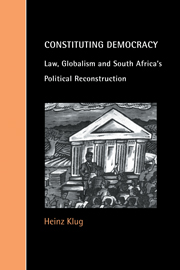Book contents
- Frontmatter
- Contents
- Acknowledgements
- Abbreviations
- Introduction
- 1 Post–Twentieth-Century Constitutionalism?
- 2 Legal Legacies and Constitutional Paths
- 3 Constitutionalism in Global Perspective
- 4 Constitutional Strategies
- 5 Constitutionalism in the Democratic Transition
- 6 Global Impact: International Imperatives and their Hybridization
- 7 The Constitutional Court and the Institutional Dynamics of Constitutionalism
- 8 Constitutional Imaginations and the Possibilities of Justice
- Conclusion
- Notes
- Bibliography
- Index
Introduction
Published online by Cambridge University Press: 06 July 2010
- Frontmatter
- Contents
- Acknowledgements
- Abbreviations
- Introduction
- 1 Post–Twentieth-Century Constitutionalism?
- 2 Legal Legacies and Constitutional Paths
- 3 Constitutionalism in Global Perspective
- 4 Constitutional Strategies
- 5 Constitutionalism in the Democratic Transition
- 6 Global Impact: International Imperatives and their Hybridization
- 7 The Constitutional Court and the Institutional Dynamics of Constitutionalism
- 8 Constitutional Imaginations and the Possibilities of Justice
- Conclusion
- Notes
- Bibliography
- Index
Summary
South Africa's dramatic political transition was accompanied by an equally dramatic legal revolution. This legal revolution witnessed the demise of a tradition of parliamentary sovereignty and its replacement with a supreme Constitution, a Constitutional Court and broad political support for democratic constitutionalism. While South Africa's system of apartheid, or legally-constituted racism, may have been unique in the last quarter of the twentieth century, the decision to embrace democratic constitutionalism as the basic legal element of the country's political reconstruction was much less unusual. Instead, South Africa's political reconstruction and its embrace of democratic constitutionalism were part of a massive international process of political reconstruction culminating in the collapse of state socialism in 1989. One hallmark of this process of ‘democratization’ was the formal adoption of bills of rights as the essential marker of constitutional change in the emergence of each new democratic regime.
While the adoption of a bill of rights may seem to be an obvious response to the gross violations of human rights that were the hallmark of the apartheid regime, it does not explain the degree of faith in the judiciary implicit in both the ‘interim’ 1993 Constitution and the ‘final’ 1996 Constitution. Faith in the judicial branch of government is also reflected globally in widely-spread judicial training programmes, legislative programmes and an emphasis on the ‘rule of law’ as being an essential component of post-socialist and post-authoritarian state reconstruction.
- Type
- Chapter
- Information
- Constituting DemocracyLaw, Globalism and South Africa's Political Reconstruction, pp. 1 - 17Publisher: Cambridge University PressPrint publication year: 2000

